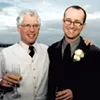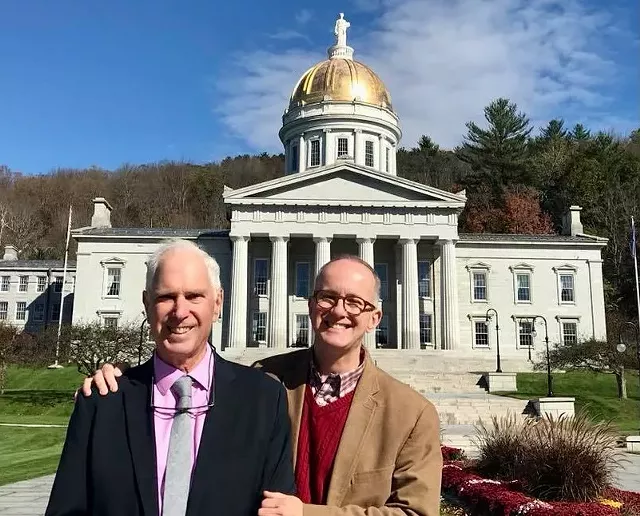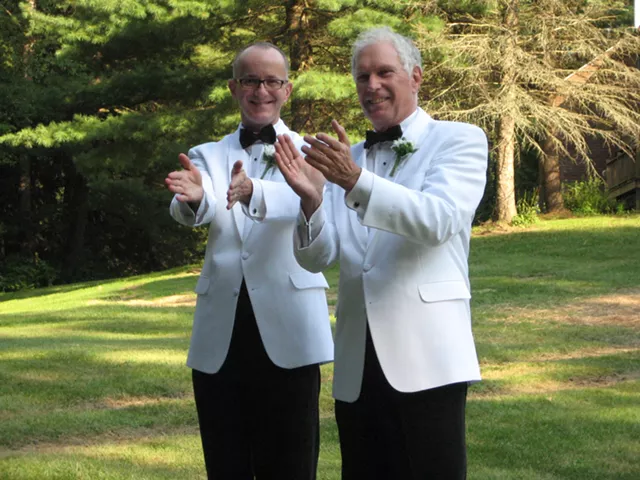Stan Baker, one of six plaintiffs in the lawsuit that led to Vermont’s landmark civil unions law, died late Monday of an apparent heart attack. He was 79.
His death, while on a trip to Louisville, Ky., was confirmed by his husband, Peter Harrigan. It comes just days before the 25th anniversary of the civil unions law taking effect.
“I’m shocked and saddened, but deeply grateful for the incredibly lovely life that we had for the time that we had it,” Harrigan told Seven Days on Tuesday.
Baker, of Shelburne, was a psychotherapist still in practice, a deacon at the Cathedral Church of St. Paul in Burlington, archdeacon of the Episcopal Diocese of Vermont and a member of the Executive Council of the Episcopal Church.
While he was deeply devoted “to equality across communities,” according to his husband, it is Baker’s role in the marriage equality movement for which he is most widely known.
Baker and Harrigan, along with two other gay couples who had been denied marriage licenses, filed suit in Chittenden County in 1997. A Superior Court judge threw out the case, Baker v. State of Vermont, and the couples appealed to the Vermont Supreme Court. That court’s December 1999 ruling became known as “the Baker decision.” Though called “the lead plaintiff,” Baker said in a March interview that he was “the named plaintiff” because all six were equal. His name just happened to come first, alphabetically.
The state’s high court ruled that Vermont marriage laws discriminated against gay couples and instructed the state legislature to find a remedy: marriage or a parallel institution. The debate that followed roiled the state like no other issue in modern history.
In April, Seven Days wrote about the 25th anniversary of the law. A picture of Baker and Harrigan celebrating their civil union was featured on the cover of the issue.
Vermont’s Civil Union Law Was Passed 25 Years Ago, Sparking the Nationwide March to Marriage Equality

Vermont’s Civil Union Law Was Passed 25 Years Ago, Sparking the Nationwide March to Marriage Equality
By Mary Ann Lickteig
Politics
On Tuesday, friends and colleagues remembered Baker as thoughtful, eloquent, kind and gentle.
“He was incredibly courageous in the face of physical threats and cruel words hurled at him and Peter during the civil unions debates,” Susan Murray, one of the lawyers who represented the plaintiffs, wrote in an email. “But Stan never demonized those who opposed his fight for equality. He saw his critics for who they are: complex human beings, and not just ‘the opposition’ … He will be sorely missed.”
Fellow plaintiffs Lois Farnham and Holly Puterbaugh recalled Baker’s “dulcimer” tones. “He was the speaker for the six of us,” Farnham said.
Bill Lippert, who was a member of the legislative committee that wrote the civil unions law, called the measure “a bitter pill to swallow” for the six plaintiffs because it wasn’t full marriage equality. But Baker, along with Harrigan and others, continued to work for that right. “His name will be forever in the history books,” Lippert said.
In addition, Lippert said, Baker was “a brilliant psychotherapist” known for his work with families and children with autism. “In the field of mental health in Vermont, he was very highly regarded,” said Lippert, a fellow psychotherapist who once hired Baker to work at the Counseling Service of Addison County.
Tom Little, the Shelburne lawyer who chaired the committee that wrote the civil unions bill, praised Baker’s manner as an Episcopal deacon. Though they were not members of the same Episcopal parish, Baker counseled Little and his family through the death of Little’s brother, son and wife.
“I don’t think I’ve ever met anyone whose pastoral care or presence was more engaged and evident and loving and focused than Stan’s,” Little said.
Stannard Baker was born May 3, 1946, in Manhattan, Kan., and grew up Quaker in Long Beach, Calif. Drawn to small-town life, and a descendant of Green Mountain Boy Remember Baker, he moved to Vermont in 1971.
He came out as gay in the early 1990s, according to Harrigan, who met Baker in 1993. They were joined in a civil union at the Cathedral Church of St. Paul on Aug. 13, 2000, and married exactly 10 years later in a smaller ceremony in the back yard of their Shelburne home.
“Stan had regretted the first time around that we didn’t wear tuxedos, and so we wore them the second time around,” said Harrigan, a theater professor at Saint Michael’s College.
Baker and Harrigan had arrived in Louisville, Ky., on Sunday for the National Barbie Doll Collector Convention. Harrigan is an avid collector. Baker had had a typical day Monday, Harrigan said. He participated in a Zoom meeting of the Executive Council of the Episcopal Church, the couple went out to dinner, then watched TV. Baker had “what was probably a massive heart attack” around midnight and could not be revived, Harrigan said.
In addition to Harrigan, Baker is survived by his sister, Jane Franklin, of Chico, Calif. His brother, Hugh, died before him.
Q&A: Meet a Married Couple Who Are Wild for Barbie

Q&A: Meet a Married Couple Who Are Wild for Barbie
By Eva Sollberger
Stuck in Vermont
Harrigan and Baker were one of many couples who traveled the state to tell their story to help Vermonters warm to the idea of marriage equality in the 1990s. The “tell your story,” strategy proved to be successful, Baker said in an interview earlier this year.
“It was much easier to say, ‘I hate fags’ or some version of that than to say, ‘I hate Peter and Stan,'” Baker said.


